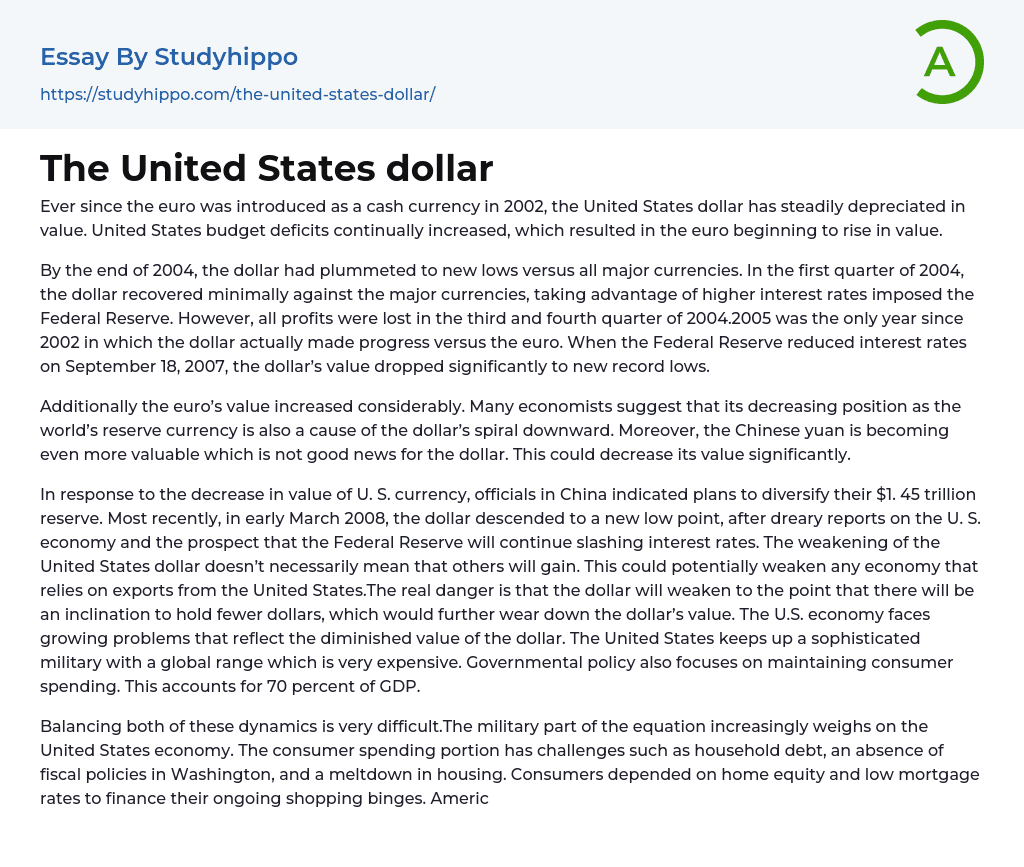Ever since the euro became a physical currency in 2002, there has been a consistent depreciation of the United States dollar. This depreciation can be attributed to the increasing budget deficits in the US, which subsequently caused an increase in the value of the euro. Towards the end of 2004, major currencies saw historically low exchange rates for the dollar. However, there was a slight improvement for the dollar against these currencies during Q1 2004 as a result of higher interest rates implemented by the Federal Reserve.
In the third and fourth quarter of 2004, all profits were lost. However, in 2005, the dollar experienced growth compared to the euro for the first time since 2002.
After the Federal Reserve decreased interest rates on September 18, 2007, the dollar's value plummeted while the euro strengthened significantly.
Economists attribute
...the decline of the dollar to its diminishing status as the world's reserve currency.
The increasing value of the Chinese yuan also poses challenges for the dollar and may lead to a significant decrease in its worth.
Chinese officials have stated that they plan to diversify their reserve of $1.45 trillion in response to the devaluation of the American currency.
The United States dollar reached a new low in March 2008 due to negative reports and anticipated interest rate cuts by the Federal Reserve. It is worth mentioning that the depreciation of the dollar may not necessarily benefit other currencies.
The focus is on the potential impact of a weakened economy that depends on US exports. The main concern involves the devaluation of the dollar, which could result in decreased circulation. As a result, this would further undermine the value of the dollar and
worsen existing problems in the US economy. These issues stem from a devalued dollar and include various factors such as the expensive upkeep of a large global military presence. Moreover, government policy seeks to sustain consumer spending, which accounts for 70% of GDP.
Balancing both dynamics mentioned – the military aspect impacting the US economy and the challenges faced by consumer spending – is a very difficult task. The economy is increasingly burdened by the military sector, whereas consumer spending is hindered by household debt, the lack of fiscal policies in Washington, and a housing crisis. To sustain their excessive shopping habits, consumers heavily relied on home equity and low mortgage rates. However, this led to America's household savings becoming negative due to the purchase of numerous imported goods. The stability of the US economy also relies on a consistent inflow of foreign investment into various forms of bonds including US Treasury, federal agency, and corporate bonds. These foreign investments are crucial as they ensure a continuous flow of credit to consumers, enabling them to purchase merchandise from Asian and European countries.
Although there are concerns regarding the decrease in savings and prolonged deficits in the US, foreign central banks still have a vested interest in supporting this system despite the declining value of the dollar. The reason for this is that foreign investors provide American consumers with affordable funds to buy their goods, which creates a continuous cycle that sustains economic growth both within the US and globally. However, major international industrial companies that either export to the US or price their products in US dollars are becoming increasingly worried about the declining dollar. Consequently, these
businesses are starting to move away from accepting payments in US currency.
The dollar's value compared to other currencies, particularly the euro, is being impacted by uncertainty, which is decreasing its appeal.
Works Cited
- <ww.useconomy.about.com/od/fiscalpolicy/p/US_Debt.htm.> (2008, April 10)
- Who Gains When the Dollar Stinks.(2008, April 10) <http://yaleglobal.yale.edu/display.article?id=10019>
- American Dream essays
- Barriers To Entry essays
- Capitalism essays
- Central Bank essays
- Compensation essays
- Consumerism essays
- Economic Development essays
- Economic Growth essays
- Economic Inequality essays
- Economic System essays
- Economy essays
- Employment essays
- Export essays
- Finance essays
- Free Trade essays
- Gross Domestic Product essays
- Human Development essays
- Income Inequality essays
- Industry essays
- Inflation essays
- International Business essays
- International Trade essays
- Macroeconomics essays
- Materialism essays
- Max Weber essays
- Microeconomics essays
- Minimum Wage essays
- Monetary Policy essays
- Monopoly essays
- Pricing essays
- Profit essays
- Recession essays
- resources essays
- Taxation essays
- Trade essays
- Unemployment essays
- Warehouse essays
- World economy essays
- Bank essays
- Banking essays
- Corporate Finance essays
- Credit Card essays
- Currency essays
- Debt essays
- Donation essays
- Enron Scandal essays
- Equity essays
- Financial Accounting essays
- Financial Crisis essays
- Financial News essays




